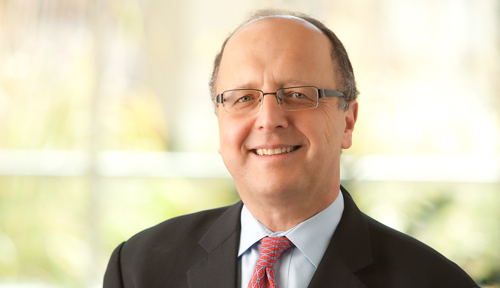UNMC has been selected as one of 11 medical centers in the country participating in a novel study using adult stem cells as a treatment for stroke patients.
The treatment — called MultiStem® and manufactured by Athersys, Inc. — uses a collection of stem cells derived from a bone marrow aspirate taken from a single adult donor. Using special technology, the cells have been multiplied to allow for easy availability and immediate usage.
Pierre Fayad, M.D., the Reynolds Professor of the UNMC Department of Neurological Sciences and director of The Nebraska Medical Center Stroke Center, will serve as principal investigator for UNMC’s portion of the study.
“Stroke is a leading cause of death and disability in adults with very limited treatment options,” Dr. Fayad said. “We’re excited to be selected as one of the centers for this study. It will allow us to offer our patients a completely new approach to treating stroke.”
The study is being conducted nationwide through leading stroke centers across the country.
|
|
UNMC will be responsible for enrolling between six and 10 patients over approximately the next 18 months, Dr. Fayad said.
For information on patient eligibility for the study, see sidebar.
The study is a double blind, placebo controlled Phase II clinical trial. The purpose of the Phase II study will be to determine the safety and tolerability of MultiStem®. In tests on rodents that have undergone an experimentally induced stroke, one treatment of MultiStem® produced significant improvement in motor skills and reduced inflammatory damage in the brain without causing any serious side effects.
“Stroke causes inflammation in the brain,” Dr. Fayad said. “If you can block the inflammation, you may improve the patient outcome. This is a novel way of modifying the body’s response to inflammation when someone has a stroke, without taking apparently significant risks. The cells have a significant effect on the immune system’s reactions that are not attainable with existing pharmaceuticals.”
When someone has a stroke, the person’s spleen shrinks as inflammatory cells migrate to the site of the stroke. In rodents treated with MultiStem® following a stroke, the spleen size remained normal and increased levels of anti-inflammatory cytokines were found in the blood.

Hi, Tom, a very informative article. How many patients with ischemic and hemorrhagic strokes are treated annually at UNMC? Thanks!
In response to the question below: UNMC annually has an average of over 700 patients with stroke, TIA, or cerebrovascular disease every year.